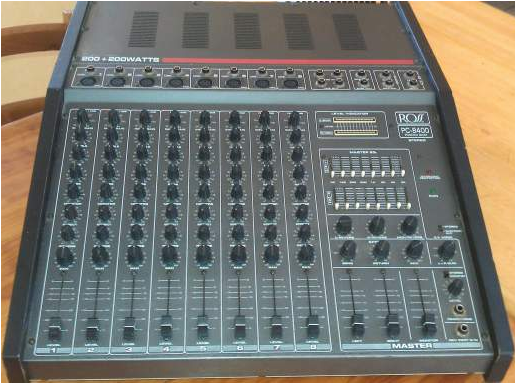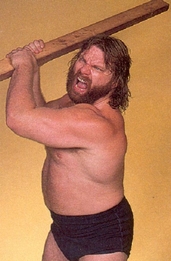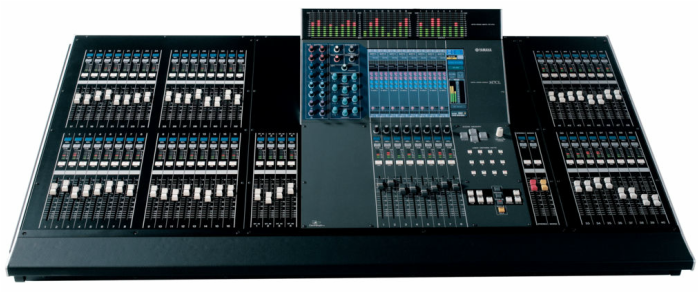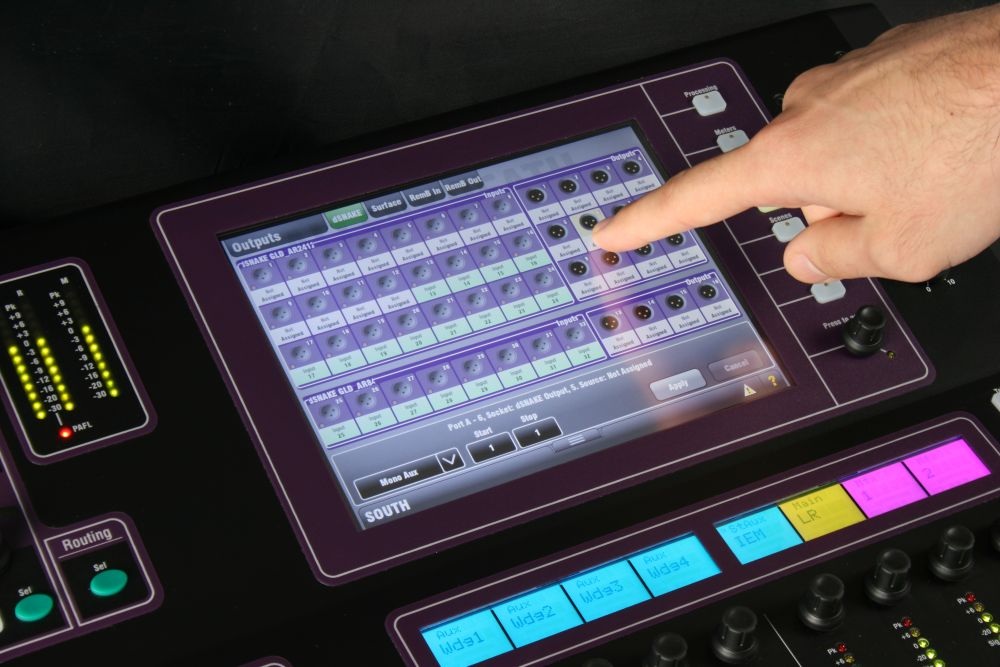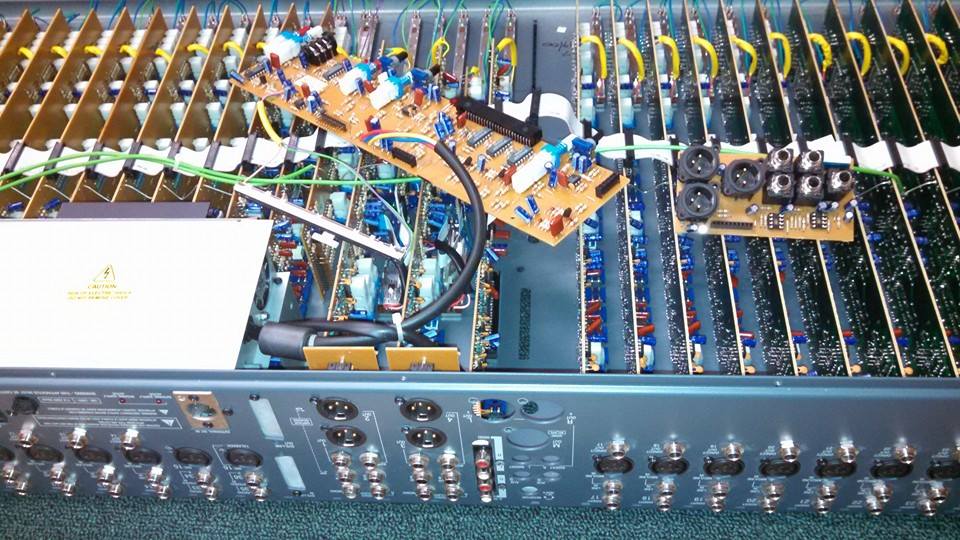|
It was 2001, and I was one of two FOH engineers for a medium sized congregation here in south Louisiana. Me and the other guy would alternate Sundays engineering, and this one particular Sunday it was my turn. I find out the day before that we are going to have a "Youth Sunday" at our church where the youth group took over the main service. Because of this, I decide that I'm going to get there early to make sure everything is rolling well. To my dismay, I find out that someone in leadership gets the bright idea that they don't want the youth group to use the house system. Instead, they bring out an old portable system they had in storage. Mixer, Speakers, Snake, Microphones...everything. Not only that, but they also decide that at the last minute, they are going to slap together a separate sound booth. I walk into the new booth to find out what kind of gear I have to work with, and to my dismay I find this Ross powered mixer: Except the one I had, had about 20 years of dust on it, some of the knobs were missing, and I am pretty sure that when I turned it on, it coughed like a 70 year old chain smoker. I ask a volunteer there, "Hey, do we have an extra graphic EQ I can borrow?" Then the dude looks at me and says, "You don't need one, it's built right into that there sound board." I start to panic and go see what they have me running for speakers - Oh yea baby, Audio Centron all the way. The 1980's value brand leader! 100 ft. speaker cables under the chairs; nice and thick to handle the 200 watts of Ross chest thumping glory for about 400 people. Microphones were of the Asian variety, & each with a "handy dandy" switch on them. Drum set was a 1980's something or another, and the guitars were rather pointy. To make matters better for the devil himself, the youth band get there late, and start "sound checking." Then, about 5 minutes later, the congregation files in. Off we go! How exciting. The band starts playing, and it sounds like a blend of Sandy Patti, The Ramones, and Yoko Ono. Not just stylistically speaking, but as if 3 different songs are being played at the same time. About five minutes into this onslaught sonic fury of geriatric terrorism, an armchair engineer comes up to offer me some "much needed" advice to the tune of: "Oh my God, what are you doing?"
Audio is a really tough gig. When everything goes splendidly, you rarely get any credit, and when it goes terrible, everybody and their grandmas will tell you what you need to do, and how bad it turned out. This audio engineering gig has been a really long ride, but it still is very rewarding. You sooner or later will get to the point that it really doesn't matter if you are recognized for your work or not. I'm not saying that it isn't deserved or that it shouldn't be appreciated, but what matters is being recognized by our Father. We as audio engineers in the church serve God by serving people. We really have an audience of One. When things get rough & heated & stressful (which will happen), we all have to remind ourselves that people are more important than our reputation as audio professionals.
2 Comments
Disclaimer: This is not about analog vs. digital. Don't read into what I am not saying. I love digital consoles, and I can run them with the best of them, but... I have been worried about a trend I have been seeing in the church audio tech community. Without finding out each congregation's needs and challenges, I have seen my colleagues blindly recommend purchasing a digital mixing console. Most churches in America average around 200 members or less. Worldwide, this number is allot smaller. Because of this, a majority of churches do not have a pool of technically proficient people to pull from that is wholly committed, and shows up on time. If this sounds like the type of church you attend, here are a list of reasons why you may want to remain with an analog console: 1. An analog console does not have anywhere near the learning curve a quality digital console has. For instance: I have a technically proficient friend that purchased a very simple inexpensive digital console a year ago, and is still trying to figure out all the ins & outs to it. On the other hand, I have personally taught countless volunteers how to run an analog mixing console in less than an hour. 2. If your engineer doesn't show up on a Sunday, will "Uncle Earl" know how to run a digital console? "Hey Uncle Earl, I need you to patch something in for me on this channel." Don't worry, we bought an easy to use digital console: 3. Are digital consoles extremely powerful? Yes. One of the perks of a digital console is the ability to patch in any effect or numerous effects on any channel. Most worship leaders of medium-sized churches would say this is not necessarily a positive thing when thinking about who's in the booth every Sunday. "Oh look a flanger! That would be cool on the worship leader's voice!" 4. When something goes wrong on a digital console: a. It is typically very difficult to find anyone local in most cities certified to repair a digital console...and not only a digital console, but your particular brand of console. b. You usually have to send it to another state to have it repaired. This is called DOWNTIME and it's not fun! I guess in that case, you'll just have to do without? c. This is a picture of an analog Allen & Heath GL Series mixing console I repaired recently. It took me one hour to repair 3 faulty channels (someone had dropped coffee on one channel, and something very heavy had dropped on 2 channel's faders). There was also an auxiliary master control in the master section of the console that was out. Take note: The console was still functional and useable even though these items were faulty. You see that nifty white flat thing running the length of the console in the middle of the picture? That's called a ribbon cable. You can take out a module for repair, and the whole console still functions. One of the faders had to be ordered (it was cheap). After I fixed most everything on it, we turned the console back over and prepared it for their service coming up that night. Once the fader came in a week later, I soldered it in-between services. They had ZERO downtime. BTW: This console was about 10 years old. It's not obsolete. Never needs a software update. It just works.
5. No Firmware, Software, or Drivers to download, update, or flash on an analog console. No software component to freakout mid-service. No Lockups. No hours on a phone with tech support. I am only bringing this up because I have seen numerous complaints about this type of behavior from affordable digital consoles. 6. Most churches in this country cannot afford a quality digital console. So, they'd have to purchase an affordable digital console. An affordable digital console may have allot of bells and whistles up front, but typically won't remain a solid mixing platform you can rely on in the long haul. If you gave me a choice between an X32 digital console (a budget conscious digital console) and a ZED analog console (budget conscious analog console), and told me it would have to be solid for the next 5 years, I'd much rather go with the ZED. The ZED is $600 cheaper to boot, and I know that it would be reliable. 7. But wait! What about recallable scenes to help someone use on Sunday? They probably wouldn't know how to access it anyway, and it takes more than just recalling a scene to mix an entire service. Furthermore, an analog console's "scenes" don't change. No scene to recall...it's already there from the previous Sunday. It's called real knobs, and it wouldn't take that long for someone to know how to use them. I want someone to be focused on mixing music and the message, rather than getting lost in technology. We are missing the main point when this occurs. In closing - I love digital consoles. I've been running them since they first came out, but I just don't think they are a right fit for most congregations. |
Do you like vintage recording gear and articles? You should visit our sister site: The Vintage Audio Portal!
**Advertise With Us! We have thousands of visitors a day. Contact us here to learn more.
Archives
August 2021
Categories |
